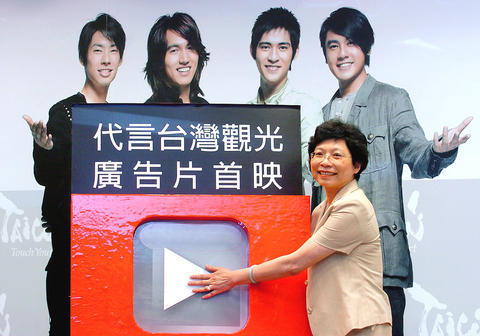The Tourism Bureau premiered a TV commercial yesterday featuring the popular boy band F4, scheduled to be broadcast in Japan and Korea starting next month.
The 30-second TV spot is part of the bureau's aggressive marketing campaign to increase the number of Japanese and Korean tourists visiting Taiwan each year.
The story begins with a Japanese tourist receiving a letter from Taiwan, then shifts to four famous local scenic spots, which are visited by the F4 members.

PHOTO: LIAO CHEN-HUEI, TAIPEI TIMES
Jerry Yan (言承旭) appears in an exhibition room at the National Palace Museum, looking at Chinese calligraphy and then becoming one of the characters in an ancient painting.
Vanness Wu (吳建豪) is first seen playing with a lantern in Pingsi (平溪), Taipei County. Two seconds later, Taipei 101 is seen, amid exploding fireworks.
Ken Chu (
Meanwhile, Vic Chou (周渝民) is seen playing with a Taiwanese puppet, with the traditional art center in Ilan County in the background.
The bureau's director general Janice Lai (賴瑟珍) said yesterday that the commercial will appear on 14 TV stations in Japan and three in Korea.
Lai said that a TV series featuring F4 will also begin shooting next month. Based on the contract, the series will be broadcast by the end of this year.
Lai also confirmed that Yan will not be in the TV series due to prior obligations. While Chu and Chou are guaranteed to be in the series, Lai said the bureau was working to get Wu on board.
To Lai, the commercial was a gratifying experience.
"Many Japanese tourists are impressed by the snacks at the night markets, the fortune-tellers or the Hsiaolongbao [little steamed buns]," she said." What we are trying to create is a fresher image. Through the charm of these four people, we hope to give our guests a better understanding of Taiwan."
Besides the TV networks, the commercial will also feature on flights from Japan and Korea before they land in Taiwan.
The bureau is hoping to increase the number of Japanese tourists to 1.23 million and that of Koreans to 210,000 annually.

US President Donald Trump said "it’s up to" Chinese President Xi Jinping (習近平) what China does on Taiwan, but that he would be "very unhappy" with a change in the "status quo," the New York Times said in an interview published yesterday. Xi "considers it to be a part of China, and that’s up to him what he’s going to be doing," Trump told the newspaper on Wednesday. "But I’ve expressed to him that I would be very unhappy if he did that, and I don’t think he’ll do that," he added. "I hope he doesn’t do that." Trump made the comments in

Japanese footwear brand Onitsuka Tiger today issued a public apology and said it has suspended an employee amid allegations that the staff member discriminated against a Vietnamese customer at its Taipei 101 store. Posting on the social media platform Threads yesterday, a user said that an employee at the store said that “those shoes are very expensive” when her friend, who is a migrant worker from Vietnam, asked for assistance. The employee then ignored her until she asked again, to which she replied: "We don't have a size 37." The post had amassed nearly 26,000 likes and 916 comments as of this

Tourism in Kenting fell to a historic low for the second consecutive year last year, impacting hotels and other local businesses that rely on a steady stream of domestic tourists, the latest data showed. A total of 2.139 million tourists visited Kenting last year, down slightly from 2.14 million in 2024, the data showed. The number of tourists who visited the national park on the Hengchun Peninsula peaked in 2015 at 8.37 million people. That number has been below 2.2 million for two years, although there was a spike in October last year due to multiple long weekends. The occupancy rate for hotels

A cold surge advisory was today issued for 18 cities and counties across Taiwan, with temperatures of below 10°C forecast during the day and into tonight, the Central Weather Administration (CWA) said. New Taipei City, Taipei, Taoyuan and Hsinchu, Miaoli and Yilan counties are expected to experience sustained temperatures of 10°C or lower, the CWA said. Temperatures are likely to temporarily drop below 10°C in most other areas, except Taitung, Pingtung, Penghu and Lienchiang (Matsu) counties, CWA data showed. The cold weather is being caused by a strong continental cold air mass, combined with radiative cooling, a process in which heat escapes from